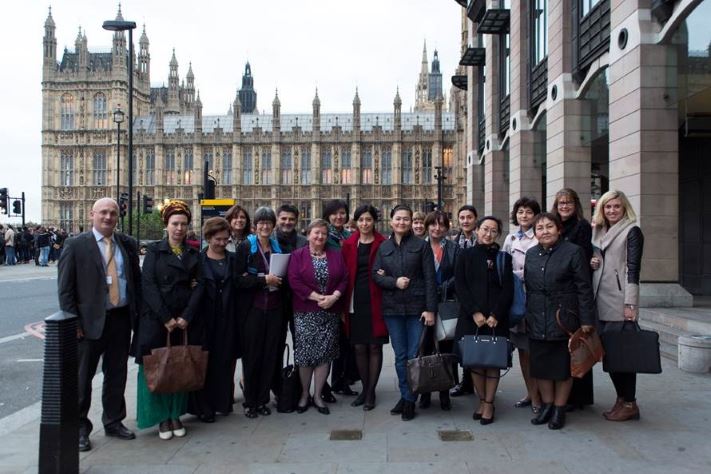18th November 2014
Recently, a group of early childhood health and development professionals from Central and Eastern Europe and the Commonwealth of Independent States (CEE/CIS) had a very special experience in the UK. Each one was invited into the home of a newborn baby. There they were able to witness a home visit made by a health visitor. They observed how the health visitor assessed the baby, gave guidance and support to the new mother and family, the questions she was asked, and how she handled the concerns that were expressed to her.
Several countries in CEE/CIS are undertaking reforms in the health sector. Given its universal reach in this region, the health system is the best entry point to promote the wellbeing of young children, especially those from vulnerable and disadvantaged groups. UNICEF is supporting governments to improve health home visiting through its initiative on ‘A Young Child’s Right to Comprehensive Wellbeing’. It is in this context that the UNICEF Regional Office for CEE/CIS partnered with The Institute of Health Visiting (iHV) London to organise a study tour from October 20-24, 2014 for professionals from the region.
The UK health visiting service model is of special relevance to CEE/CIS as it is a public sector offering and because it is based on a universal progressive (rather than targeted) approach. This approach provides some services for all families and enhanced or intensive services for families with particular needs. As a country with a large immigrant population, income disparities and many social and economic challenges, the UK has made investing in the early years a top priority. Currently, the government is significantly increasing the number of health visitors in order to reach all families with its basic universal Healthy Child programme and to identify and serve families with additional needs.
Home visits in the UK differ in a fundamental way from what is most commonly offered to young children and families in CEE/CIS. Going beyond the medical approach, UK health visitors (all fully qualified nurses or midwives with one year’s additional training) look comprehensively at the family situation, provide critical information, engage families around positive parenting, and link them as needed, to other social services.
In the five-day study tour, the iHV provided a comprehensive programme on all aspects of health visiting services in the UK, including:
- how home visiting services developed historically
- the current policy environment
- the underlying neuro-science and social determinants evidence base
- the process of developing and maintaining of home visiting standards
- financing
- recruitment policies and the training and mentoring of health visitors to make them “fit for purpose” to empower families to do the best for their children
- health visitor opportunities to specialise in safeguarding children and perinatal mental health to become local champions or trainers
- and, of course, the continuing challenges with high workloads and demands.
More than 20 experts, including from the Department of Health; university faculties involved in training health visitors or conducting research; experienced and newly-trained health visitors, preceptors, and managers; general practitioners; and, the visited families, contributed with their perspectives.
Additionally, on October 23, the group was hosted by Tim Loughton, MP and Co-Chair of the ‘All-Party Parliamentary Group for Conception to Age Two – The First 1001 Days’, an important advocacy effort by UK law makers to promote young child wellbeing across party lines. He discussed the importance of the 1001 Critical Days Manifesto in the upcoming UK elections. He also shared a report released by the London School of Economics the day before, specifying that unaddressed perinatal mental health problems cost the UK $8.1 billion pounds for each one-year birth cohort.
What was so valuable about the study tour was not only the interaction with UK experts and the direct observations but also the wealth of resources to which they were introduced and could potentially use to shape reforms.
“The whole study tour was very inspirational – every presenter was passionate about their work. “
Dr. Lela Tsotsoria, Chief Specialist Health Care Department, Ministry of Labour, Health and Social Affairs of Georgia
“I liked the way this complex issue was presented. We were all particularly impressed with what we observed in the home visit.”
Dr. Gul Garryyeva, Chief Paediatrician, Ministry of Health and Medical Industry, Turkmenistan
Note: The Institute of Health Visiting (iHV) London, was set up with support from the UK Government to serve as the Centre of Excellence for UK health visitors, government, other professionals from the health and related sectors working with pregnant women and families of young children, provider organisations, and national professional and voluntary bodies. The Founding Director of the iHV, Dr. Cheryll Adams and several of her colleagues are members of a UNICEF Technical Advisory Group on Young Child Wellbeing.
Update shared by Bettina Schwethelm, UNICEF Regional Office for Central and Eastern Europe and the Commonwealth of Independent States (CEE/CIS)


